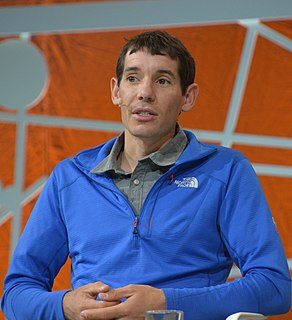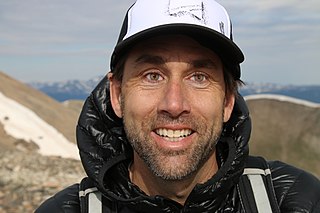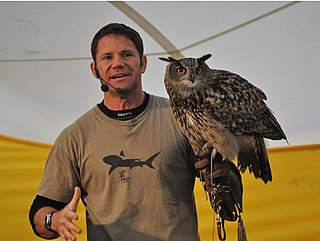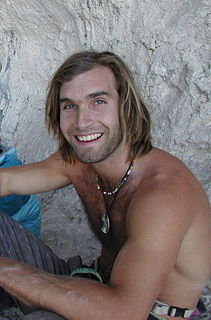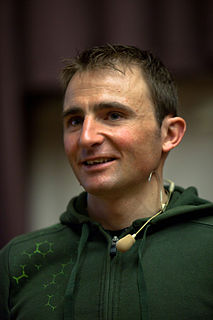A Quote by Alex Honnold
If you're climbing big routes that'll take you 16 hours, or, like, El Capitan, you have to take something like a big, robust sandwich. Climbing isn't like running or triathlons, where you have to constantly be eating blocks, gels, and pure sugar. Climbing is relatively slow, so you can pretty much eat anything and digest it as you climb.
Related Quotes
Seven years ago, when I started free soloing long, hard routes in Yosemite - climbing without a rope, gear or a partner - I did it because it seemed like the purest, most elegant way to scale big walls. Climbing, especially soloing, felt like a grand adventure, but I never dreamed it could be a profession.
Climbing a big wall over several days is like running a giant construction project: constantly making lists, rigging ropes, organising food, figuring out camera angles - but you're in this crazy place with your best friends, and it does take on a party atmosphere sometimes, like a big dudes' camping trip.
Yosemite has the most impressive and accessible granite big walls in the world. The rock is amazing. And because of that, it's been the mecca for climbing in the U.S. - and the world to a large degree - for all of climbing history. It's the place to test yourself against the historic routes of the past.
In a sense everything that is exists to climb. All evolution is a climbing towards a higher form. Climbing for life as it reaches towards the consciousness, towards the spirit. We have always honored the high places because we sense them to be the homes of gods. In the mountains there is the promise of... something unexplainable. A higher place of awareness, a spirit that soars. So we climb... and in climbing there is more than a metaphor; there is a means of discovery.
I think one of the things we learned from the physicists and also the theoretical biologists is the idea that when you're dealing with very complex systems you're going to get a large variety of behavior which can be interpreted as hill climbing, but hill climbing with a lot of modifications, hill climbing with big jumps occasionally.
Dreams, in their essence, include risk. This risk could be physical danger (often true in climbing big mountains like Everest), or it could be financial (leaving a comfortable job and pouring your life savings into a business venture), or it could be emotional (like the feelings of loss and questioning that comes with losing friends and coworkers to climbing accidents).
We search out the most perfect pieces of rock. It's so amazing that these formations are so perfect for climbing on. It's almost as if they were created for climbing. You're taking these random rock formations and you're bringing to it this interaction. It transforms it from being this random rock into almost this piece of art. It's almost like a sculpture or something. Just by finding the handholds, finding that line up the rock. Every climb is different, has its own unique set of movements and body positions. Climbing and my appreciation for nature are totally intertwined.
